Jaguar Land Rover has said it will ‘pause’ all of its shipments to the US as it works to ‘address the new trading terms’ of Donald Trump‘s tariffs.
A 25% levy on all foreign cars imported into America came into force on Thursday, and a wider ‘baseline’ 10% tariff on goods imported from around the world kicked in on Saturday morning.
The move from the British car firm comes as companies are grappling with the new trade rules, and the fallout on the global stock markets.
‘The USA is an important market for JLR’s luxury brands,’ the company said in a statement.
‘As we work to address the new trading terms with out business partners, we are taking some short-term actions including a shipment pause in April, as we develop our mid-to-longer term plans.’
Trading across the world has been hammered in the aftermath of the president’s tariff announcement at the White House on Wednesday.
The UK automotive industry is expected to be hard hit by the new tariffs, which come at a time when British carmakers are struggling with declining demand at home and the need to retool their plants for the transition to electric vehicles.
‘The industry is already facing multiple headwinds and this announcement comes at the worst possible time,’ Mike Hawes, chief executive of the UK’s Society of Motor Manufacturers and Traders, said last week.
The number of cars made in the U.K. dropped 13.9% to 779,584 vehicles last year, according to the SMMT. More than 77% of those vehicles were destined for the export market.
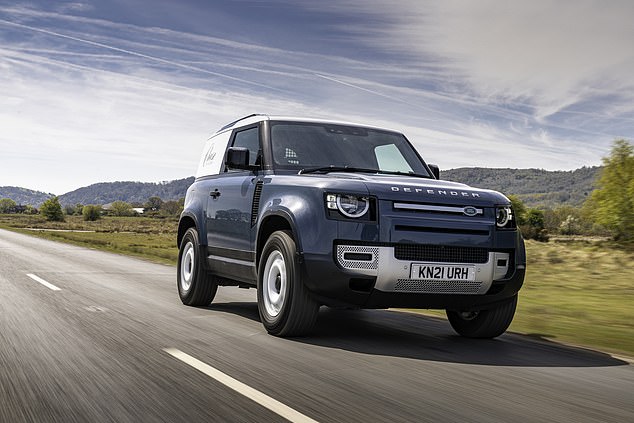
A 25% levy on all foreign cars imported into America came into force on Thursday, and a wider ‘baseline’ 10% tariff on goods imported from around the world kicked in on Saturday morning (stock image)
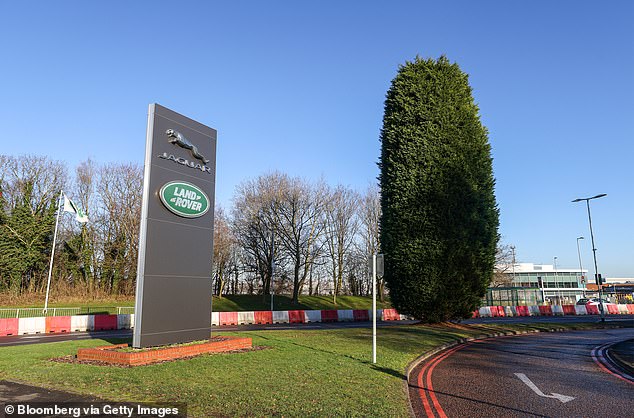
The move from the British car firm comes as companies are grappling with the new trade rules, and the fallout on the global stock markets
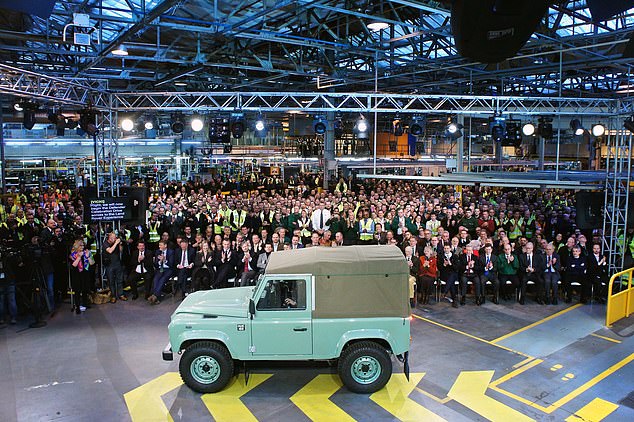
There are fears of job losses at Jaguar Land Rover’s Solihull factory (pictured) where 9,000 workers could lose their jobs following Donald’s Trump’s imposition of import taxes
Carmakers in the UK have already taken steps to lessen the immediate impact of the tariffs by building stockpiles in the US before the increase took effect.
Roughly 8.3 billion pounds worth of vehicles were shipped from the UK to the U.S. in the 12 months through September, making cars the single biggest goods export to the US, according to government statistics.
It comes following fears from locals living near a JLR factory in the West Midlands that its 9,000 workers could lose their jobs following Trump’s imposition of import taxes.
Solihull residents have expressed concerns for the future of the town, which is home to one of JLR five UK manufacturing plants.
Trump wants carmakers to move production to the US to swerve tariffs but research from GlobalData shows JLR makes no cars in America, making it the most at risk of any car brand in the country.
JLR made a defiant statement earlier this week, saying ‘our business is resilient’ and claiming it was ‘accustomed to changing market conditions’.
But those with experience of working in the industry themselves are less optimistic.
Former automotive consultant and Solihull resident Robert Mills, 70, fears the worst for the town and believes Trump’s tariffs could spell the end for a number of jobs.
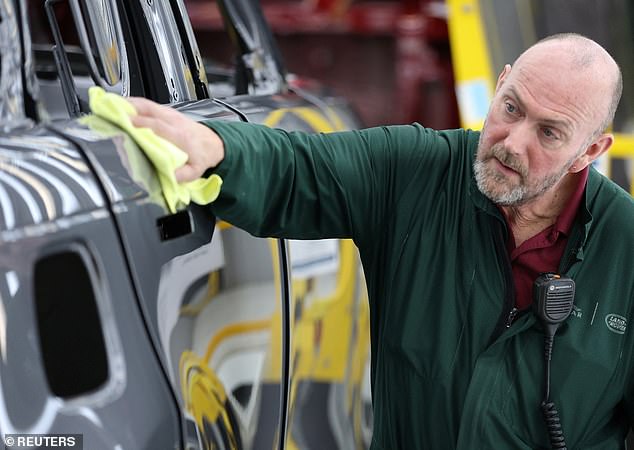
A member of staff checks the paintwork on Range Rover bodies as they pass through the paint shop at Jaguar Land Rover’s factory in Solihull
‘I’m appalled. It will kill Jaguar Land Rover here in the town,’ he told The Guardian.
‘There could potentially be job losses because JLR export enormously to America. The knock-on effect is going to be enormous.’
Mr Mills is sceptical that Trump will be able to encourage car manufacturers to relocate across the Atlantic.
He claimed the factories in some US cities were ‘all gone’ and would be incapable of replicating operations from overseas.
Former electrical engineer Tony Rhea, 77, who worked with Land Rover before he retired, is equally concerned of the impact of Trump’s tariffs on the town.
He fears the impact on business will spread beyond just factory workers.
‘Everyone is affected. Right down to the cafe where they eat, the people who wash their overalls and even the people that maintain the robots, that’s all local.’
His partner Rhea, 75, agrees and is uncertain how the UK should respond.
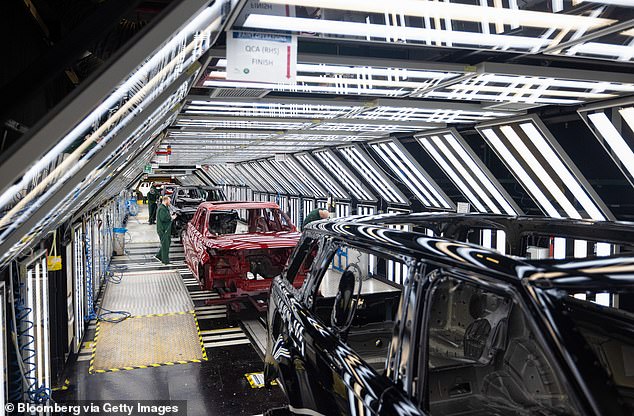
Range Rover sports utility vehicles in the paint shop at Jaguar’s manufacturing plant in Solihull in 2023
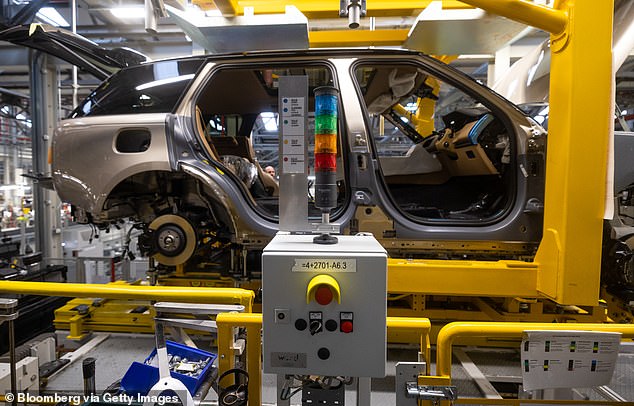
A Range Rover sports utility vehicle on the production line at Jaguar’s manufacturing plant in Solihull in 2023
She highlighted how Canadian prime minister Mark Carney has defiantley opposed Trump in recent weeks and questioned whether Keir Starmer should follow suit.
The Prime Minister said he was still focused on getting a deal with President Trump that could spare British firms the worst impacts of the tariff blitz.
But, in a toughening of the UK’s stance, he set a May 1 deadline for a consultation on launching a tit-for-tat response, warning that ‘all options are on the table’.
A spokesperson said last night UK officials will ‘calmly continue with our preparatory work, rather than rush to retaliate’.
Mr Trump hit countries around the world with stringent tariffs on Wednesday that are expected to wipe billions from global economic growth.
He accused other nations, including allies, of ‘looting, pillaging, raping and plundering’ the US. The EU has been hit with a 20 per cent tariff, while China is facing 34 per cent.
The Office for Budget Responsibility last week slashed its outlook for the UK’s already anaemic economic growth since Labour took power, from two per cent to one per cent – but without taking account of the trade war, which will further dent the economy.
Economists have warned it will wipe out the fiscal headroom Chancellor Racher Reeves engineered for herself last week in her Spring Statement.
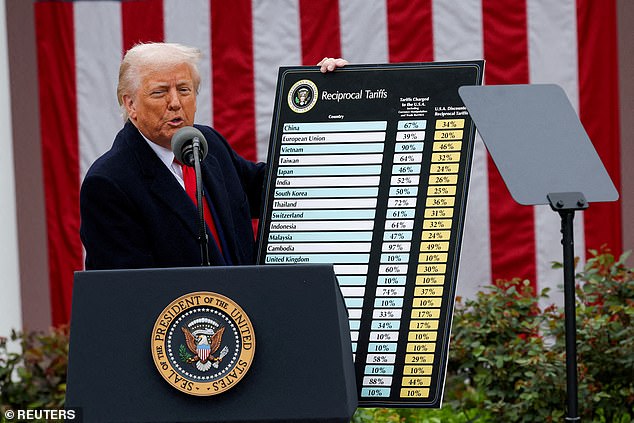
Mr Trump (pictured) hit countries around the world with stringent tariffs on Wednesday that are expected to wipe billions from global economic growth
Thomas Pugh, an economist at audit, tax and consulting firm RSM UK, believes the UK is in for ‘another year of stagnation at best’ following the imposition of tariffs.
‘This reduction in growth will probably make the Bank of England more likely to cut interest rates this year, so we still anticipate three more [quarter-point] cuts in 2025,’ he told The Financial Times.
He echoed concerns over how much fiscal headroom Reeves will have to play with, saying: ‘We wouldn’t go as far as to say this has wiped out the £10bn she just rebuilt, but it’s probably not far off’.
Downing Street declined to set out the likely impact of Mr Trump’s tariff package on UK exports.
But economists have suggested they could affect around 70 per cent of the UK’s £60billion annual exports to the US.
Sir Keir is expected to spend the weekend speaking to foreign leaders about the tariffs, after calls with the prime ministers of Australia and Italy on Friday in which the leaders agreed that a trade war would be ‘extremely damaging’.
But the US President had earlier bizarrely claimed that Keir Starmer was ‘very happy’ with the brutal tariffs he had imposed on Britain.
Speaking outside Air Force One overnight before flying to Florida, Mr Trump said Sir Keir had taken the tariffs ‘really well’.
He said, when initially asked if he had given his approval to Starmer’s Chagos Islands deal: ‘We are talking to the Prime Minister about it [chagos deal] and we will see how that turns out.
‘We have a very good dialogue and I think he was very happy about how we treated them on tariffs.’
He shrugged off the meltdown on financial markets, telling reporters: ‘The markets are going to boom, the stock is going to boom, the country’s going to boom and the rest of the world wants to see is there any way we can make a deal.
‘They’ve taken advantage of us for many, many years. Many years we’ve been on the wrong side of the ball and I tell you what, I think it’s going to be unbelievable.’







